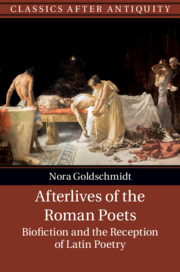Book contents
- Afterlives of the Roman Poets
- Classics after Antiquity
- Afterlives of the Roman Poets
- Copyright page
- Dedication
- Contents
- Figures
- Series Editors’ Foreword
- Acknowledgements
- Abbreviations and Note on the Text
- Introduction
- Chapter 1 Medieval Ovids
- Chapter 2 Staging the Poets: Ben Jonson’s Poetaster
- Chapter 3 Lucan and Revolution
- Chapter 4 Lucretius and Modern Subjectivity
- Chapter 5 The Death of the Author: Hermann Broch’s Der Tod des Vergil
- Post-Mortem
- Bibliography
- Index Locorum
- General Index
Post-Mortem
Published online by Cambridge University Press: 11 November 2019
- Afterlives of the Roman Poets
- Classics after Antiquity
- Afterlives of the Roman Poets
- Copyright page
- Dedication
- Contents
- Figures
- Series Editors’ Foreword
- Acknowledgements
- Abbreviations and Note on the Text
- Introduction
- Chapter 1 Medieval Ovids
- Chapter 2 Staging the Poets: Ben Jonson’s Poetaster
- Chapter 3 Lucan and Revolution
- Chapter 4 Lucretius and Modern Subjectivity
- Chapter 5 The Death of the Author: Hermann Broch’s Der Tod des Vergil
- Post-Mortem
- Bibliography
- Index Locorum
- General Index
Summary
The conclusion (‘Post-Mortem’) suggests future possibilities and brings together the interrelated threads of individual chapters to restate the case for the importance of the biofictional reception of Roman poetry not only to the understanding of ancient literature and its reception, but also to the history of modern life-writing. Taken together, the chapters in this book tell a cultural history of the biofictional reception of Roman poetry. They put the author back into the discussion of Roman poetry, and in doing so bring to light a fundamental mode of reading and writing Latin poetry which opens up new perspectives on the ways in which antiquity and its reception have helped to shape paradigms of how to read, write and live lives.
Keywords
- Type
- Chapter
- Information
- Afterlives of the Roman PoetsBiofiction and the Reception of Latin Poetry, pp. 185 - 190Publisher: Cambridge University PressPrint publication year: 2019

